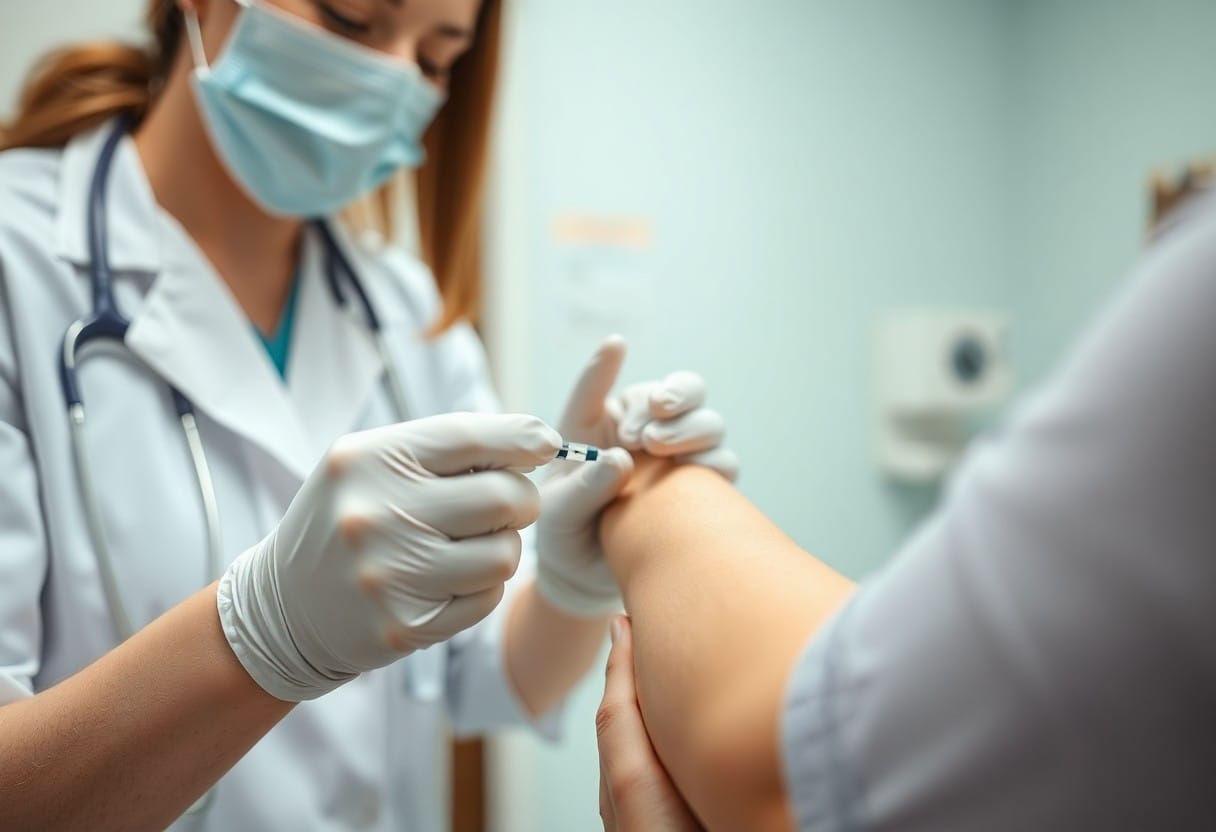Most people are not aware that filing claims for Shoulder Injury Related to Vaccine Administration (SIRVA) is on the rise following flu shots. You might be wondering why this is happening and how it could potentially impact you. Understanding the signs and symptoms of SIRVA, as well as the reasons behind the increase in claims, is vital for anyone receiving vaccinations. This informative blog post will explore the factors contributing to this trend, and offer guidance on how to protect your own health when getting vaccinated.

Understanding SIRVA
For many, receiving a flu shot is a routine part of staying healthy. However, it’s important to be aware of a rare but significant complication associated with vaccinations known as SIRVA, or Shoulder Injury Related to Vaccine Administration. This condition occurs when a vaccine is improperly injected, leading to shoulder injuries and pain. Understanding SIRVA can help you recognize warning signs and seek appropriate treatment.
Definition of SIRVA
Below, SIRVA is defined as a shoulder injury that arises from the administration of a vaccine, typically due to improper injection technique. This condition can result in inflammation and pain in the shoulder, leading to limited mobility and discomfort.
Symptoms and Diagnosis
By recognizing the symptoms of SIRVA, you can take appropriate action if you experience pain or discomfort following a vaccination. Symptoms may include persistent shoulder pain, limited range of motion, swelling, and tenderness at the injection site. A proper diagnosis is important and often involves a physical examination and imaging studies to assess the injury.
Understanding the symptoms of SIRVA can help you identify if you are affected. The signs typically occur within a few days following vaccination and can manifest as sharp pain in your shoulder, alongside swelling or reduced mobility. Early diagnosis is vital, as it allows for targeted treatment and may help alleviate pain. Your healthcare provider may recommend physical therapy or other treatments to promote recovery, emphasizing the importance of addressing these symptoms promptly to avoid long-term complications.
The Rise in SIRVA Claims
You might have noticed a significant uptick in SIRVA (Shoulder Injury Related to Vaccine Administration) claims following flu vaccinations in recent years. This increase reflects greater awareness of the potential risks associated with vaccine administration, as well as a shift in how these injuries are perceived by healthcare providers and patients alike.
Statistical Trends
Statistical analyses indicate that the number of SIRVA claims has risen by over 50% in the past five years. This trend suggests that more individuals are reporting shoulder injuries sustained during flu shot administration, leading to further investigation into proper vaccination techniques and protocols.
Factors Contributing to the Increase
Contributing factors to the rise in SIRVA claims could include:
- Increased awareness of SIRVA among patients and providers
- Educational initiatives disseminating information on proper vaccination techniques
- Greater access to claim submission processes
- Physiological variations in patient’s conditions leading to susceptibility
Thou can see that these factors collectively influence the number of claims being filed.
Claims indicate a growing concern among patients regarding medical procedures. You may find that as awareness increases, more healthcare professionals are acknowledging SIRVA as a legitimate risk during vaccine administration. Further emphasizing the importance of proper technique, the emphasis on patient education can’t be overlooked.
- Proper administration techniques significantly reduce the risk of injury
- Patient education increases informed consent
- Legislation changes affecting claim processes may encourage filing
Thou will see that addressing these elements is crucial for protecting individuals during vaccinations.
The Connection Between Flu Shots and SIRVA
The relationship between flu shots and SIRVA (Shoulder Injury Related to Vaccine Administration) has become increasingly recognized, as more individuals report adverse reactions following vaccinations. This phenomenon is linked to improper injection techniques, the volume of the vaccine, and its administration site, which can significantly affect your shoulder’s health and lead to lasting complications.
Injection Technique
Above all, the technique used when administering a flu shot plays a pivotal role in the likelihood of developing SIRVA. If the injection is given too high in the shoulder muscle or if excessive force is applied, this can result in damage to the surrounding tissues, leading to discomfort and possible injury.
Vaccine Volume and Location
On the topic of vaccine volume and location, the amount of fluid injected and the specific site chosen for the injection can directly influence your risk of SIRVA. A larger volume injected into a tight space may increase pressure on your muscles and nerves, exacerbating the chance of injury.
Another important aspect to consider is the specific location where the flu shot is administered. Typically, vaccinations are administered in the deltoid muscle, an area that can tolerate a standard vaccine volume. However, if the dosage is greater than recommended, or if the shot is given in the upper part of this muscle, you risk compromising the surrounding structures. This misplacement can lead to injury, ultimately resulting in weakness and pain in your shoulder, which could last for months or even years. Being aware of these factors can help you better understand the risks associated with flu shots and empower you to discuss any concerns with your healthcare provider.
Legal Implications of SIRVA Claims
Many individuals seeking compensation for SIRVA must navigate a complex legal landscape. It is important to understand that these claims fall under the National Vaccine Injury Compensation Program (NVICP), which aims to provide a streamlined process for those injured by vaccines. Knowing the legal aspects can enhance your understanding and preparedness for pursuing a claim, as well as help you recognize potential outcomes effectively.
Claims Process
To initiate a SIRVA claim, you must file a petition with the NVICP, detailing your injury and its connection to the flu vaccine. This involves gathering medical records, submitting supporting evidence, and often working with legal professionals who specialize in vaccine injury claims. Your diligence in this process can significantly influence your chances of receiving compensation.
Compensation and Benefits
Above all, successful SIRVA claims can lead to considerable compensation for your medical expenses, lost wages, and pain and suffering. It is vital to thoroughly document your case to maximize your potential benefits, as the NVICP aims to support individuals who experience adverse effects from vaccinations.
Legal representatives can help you decipher the intricacies of the compensation process, ensuring you meet all deadlines and requirements. You may be entitled to various benefits, ranging from medical care costs to rehabilitative services. This support is especially important if your injury affects your ability to work or participate in daily activities. With the right assistance, you can navigate the claims process effectively and secure the compensation you deserve for your SIRVA injury.
Preventing SIRVA
After receiving your flu shot, you can take several steps to significantly reduce the risk of SIRVA. Proper vaccination techniques, appropriate injection site selection, and maintaining communication with your healthcare provider are important. Be proactive in discussing any concerns with your healthcare team to ensure proper care and follow-up.
Best Practices for Vaccination
For a safe vaccination experience, always choose a qualified healthcare professional skilled in administering vaccines. Make sure to receive your shot in the recommended muscle, typically the deltoid, and avoid excessive movement post-injection to let your body properly respond.
Awareness and Education
For individuals considering vaccination, education about SIRVA and its symptoms can empower you to make informed decisions. Staying informed about the potential risks and recognizing early signs can help ensure timely intervention if issues arise.
Preventing SIRVA involves understanding its symptoms and being knowledgeable about the vaccination process. Educating yourself about common signs of SIRVA, such as pain or restricted motion in your shoulder, helps you take prompt action if necessary. Engage with your healthcare provider to discuss any adverse effects you experience post-vaccination. By cultivating a supportive environment with open communication, you can reduce the risks associated with vaccinations and promote your overall well-being.
Real-Life Cases of SIRVA
Not all individuals take the effects of flu shots lightly. Many people have come forward with experiences related to SIRVA, sharing how these claims have impacted their daily lives and overall well-being. These real-life cases often highlight the physical difficulties they encounter post-vaccination, emphasizing the need for awareness about SIRVA and the importance of recognizing the symptoms early.
Personal Testimonies
Among the numerous accounts, personal testimonies reveal a common thread of pain and frustration. Individuals have described their sudden inability to perform routine tasks and enjoy activities due to persistent shoulder pain following their vaccinations. These stories not only illustrate the immediate effects of SIRVA but also underscore the importance of seeking help when needed.
Outcomes of Legal Claims
Among those who have pursued legal claims related to SIRVA, many have found varying levels of success. Some individuals have received compensation for medical expenses, lost wages, and pain and suffering, highlighting the impact of these claims on their recovery processes.
Plus, the *outcomes of legal claims* can significantly affect your financial and emotional well-being. Many individuals have reported receiving *substantial compensation*, which can help cover *medical bills* and *additional treatment costs*. It is important to note that while some claims are successful, others may face challenges, making it crucial to seek experienced legal guidance. Your health and well-being matter, and understanding the legal avenues available can empower you to make informed decisions moving forward.
Summing up
Presently, you may notice an increase in people filing SIRVA claims after flu shots due to heightened awareness of vaccine-related injuries and better access to information. As more individuals become informed about shoulder injuries linked to improper injection techniques, it’s likely that more cases are being reported. Understanding your rights and the potential for compensation as a result of vaccine-related injuries can empower you to seek assistance if you experience any adverse effects from your flu shot. Always consult a healthcare professional for guidance if you encounter complications after vaccination.


















